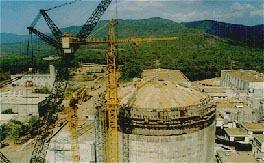Search Results
-
Global climate risk index 2009
Extreme weather events are generally expected to increase in frequency and intensity due to global climate change. They have the potential to significantly undermine progress towards
-
Reconciling human development and climate protection: perspectives from Developing Countries on Post-2012 international...
Human activity is causing irreversible harm to the climate system and environment. The Kyoto Protocol is only a good starting point to raise the awareness of climate change.
-
Impacts of financial, food and fuel crisis on urban poor
The urban poor are particularly vulnerable in times of crisis due to their heavy reliance on the cash economy, job losses and wage reductions in urban based industries, and no agricultural production to fallback on. Prioritizing investments in cities can help to mitigate impacts in the short run and reduce risks in the future.
-
Environmental stories to watch in 2009
Environmental stories to watch in 2009 talk about four stories: Will the economic stimulus be green?; What are the prospects of Congress passing climate legislation?; How will the U.S. work with China?; and Will see a new weapon for protecting global forests and stopping illegal logging?.
-
Transboundary waters: sharing benefits, sharing responsibilities
All transboundary water bodies create hydrological, social and economic interdependencies between societies. They are vital for economic development, reducing poverty and contributing to the attainment of the Millennium Development Goals.
-
Linking disaster risk reduction and poverty reduction: good practices and lessons learned
Natural hazards, which are becoming more intense and frequent, have a devastating impact on the world
-
Urban water crisis in Delhi: stakeholders responses and potential scenarios of evolution
An inadequate piped water supply from the public utility, characterized by intermittence and unreliability, and supplemented by private uncontrolled groundwater abstraction, is a common feature of most Indian cities as well as other developing cities in the world Given the high level of pollution of urban aquifers, the usual diagnosis consists in considering private groundwater abstraction as an u
-
Deterring corruption and improving governance in the urban water supply and sanitation sector
This Sourcebook is part of a broader program of work on governance and corruption in the water supply and sanitation sector. The Sourcebook is meant as a resource to assist water and sanitation sector practitioners to assess the extent and risks of corruption in the sector and to improve governance in ways that reduce corruption.
-
Climate change response strategies for agriculture: challenges and opportunities for the 21st Century
Agriculture will face significant challenges in the 21st century, largely due to the need to increase global food supply under the declining availability of soil and water resources and increasing threats from climate change.
-

Carbon Disclosure Project Report 2008: India 200
The second report on Carbon Disclosure Project in India by WWF-India, CII- ITC CESD and CDP provides global and domestic investors with an analysis of how India's 200 largest companies are responding to climate change.
-

Performance audit on management of fuel for pressurised heavy water reactors (front-end of the nuclear fuel cycle)
The audit report conducted by the Comptroller and Auditor General on management of fuel for Pressurized Heavy Water Reactors (PHWRs). DAE has been blamed for being unable to exploit the country
-
Multisector project for infrastructure rehabilitation in Jammu and Kashmir
This resettlement plan is prepared to deal with impacts of land acquisition and resettlement issues resulting from the rehabilitation of the road sub-project. The plan provides an analysis of the impacts, identifies the nature and types of losses, and establishes and entitlement matrix as a guide to payments for compensation and resettlement benefits.
-
The implications of free allocation versus auctioning of EU ETS allowances for the power sector in the Netherlands
The main objective of the present study is to analyse the implications of shifting from free allocation to auctioning of EU ETS allowances (EUAs) for the power sector in the Netherlands. In
-
The state of the worlds children 2009
The State of the World
-
Does organic agriculture lead to better health among poor farmers?
Poverty and health are inextricably linked as the poor are always the first to suffer from degraded soil, water, and environment. For poor farmers in developing countries, inappropriate use of pesticides is known to be a serious problem.
-
The economics of climate change mitigation: policies and options for the future
Considering the costs and risks of inaction, ambitious action to reduce greenhouse gas emissions is economically rational. However, success in abating world emissions will ultimately require a least-cost set of policy instruments that is applied as widely as possible across all emission sources (countries, sectors and greenhouse gases).
-
Community eco-sanitation toilets, India
Despite the fact that India is experiencing tremendous growth as an industrialised society, it is estimated that at least 400 million people live on or below the poverty line. The majority of these people live in the many tens of thousands of rural villages scattered around the sub-continent. Life in rural India has in many respects remained much the same for the past several hundred years.
-
Grasping the climate crisis
This report urges them to fully recognise the scale of the task ahead, to overcome the inertia of
-

World malaria report 2008
This report provides an overview of the global distribution of malaria cases and deaths and documents how control strategies recommended by WHO have been adopted and implemented in endemic countries.

